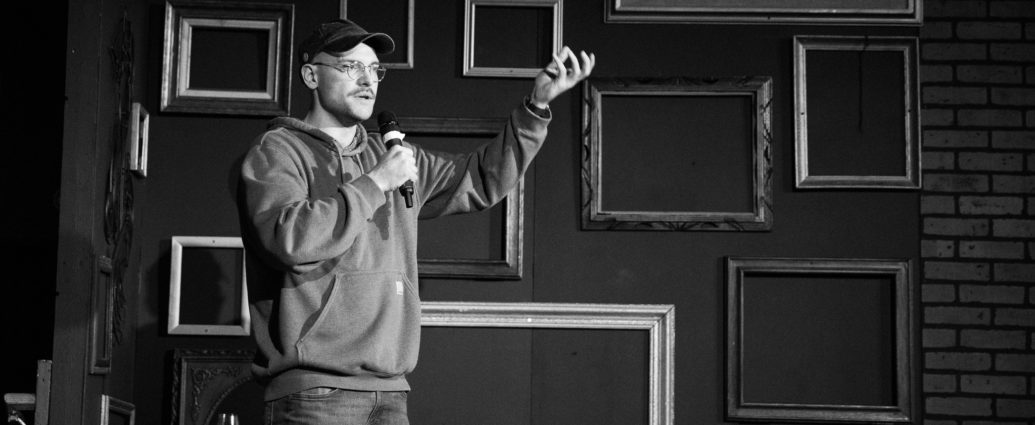How comedian James Stanley learned to laugh at his own mental health.
WORDS BY PATRICK STRAIT
James Stanley has been doing comedy his entire adult life. And some of his childhood, too.
After getting up on stage at Acme’s open mic back in 2013, when he was just 16 years old, Stanley knew performing was something he wanted to keep doing. But he had a few obstacles in his way.
“I had no license, no car, and a lot of mental health stuff going on, so I could only really go out and do it sporadically,” Stanley says of his early days in comedy. “When I graduated high school in 2015, I really started to hit it hard.”
These days, Stanley is one of the most talented and buzzworthy comedians on the Twin Cities scene. He recently became a feature (middle) act at Acme, runs a weekly open mic at Laugh Camp in St. Paul, and did his very first headlining set on the road. On stage, Stanley shares a great deal about his mental health history, including living with autism, OCD, and Tourette’s. His honesty and vulnerability have provided him with a unique perspective that connects with audiences and serves as an example for other up-and-coming comics. But that perspective didn’t happen right away.
“I was just trying to figure it out on my own,” he recalls. “I didn’t really have anyone to give me advice, or at least good advice. I was very deadpan and wrote a lot of one-liners. I was really nervous to be on stage, and was just sort of monotone and quiet.”
Stanley knew he wanted to talk about his life experience, but needed to develop as a writer and a comedian before he was ready to do it in a way that would be worth bringing to the stage.
“I remember stuff started clicking for me little by little. I’m like, ‘OK, this is a joke about OCD. This is a nice joke about, like, the autism. I remember the first autism joke I did was at Acme’s open mic. And when I did it, I just remember thinking like, ‘This is one of those milestone jokes.’”
While he may be able to laugh at his past today, Stanley had to overcome a lot to get to the place he is today.
“I overcame a lot more than I give myself credit for,” he says. “I missed basically two years of high school because I was in and out of hospitals. I had severe OCD and most doctors didn’t really know what to do with me. I was in and out of residential inpatient units, just doing hours of therapy all of the time.”
While it may not be a cure-all for everyone in a similar situation, Stanley says comedy is responsible for changing his trajectory.
“Comedy has been incredible because it helped me break out of my shell,” he says. “I was so shy, and it was really hard for me to make friends. I didn’t know how to connect with people. Comedy helped me to make friends. Plus, before when bad things would happen, I would get really beat up about it. Now I’m like most comedians, in that something bad happens and it’s like, ‘Oh this sucks, but it’s going to make a great bit.’”
Like the rest of his comedy career, his most important recent comedy milestones happened at Acme. From getting hired as an emcee a little more than two years ago, to moving up to a feature slot this past month, Stanley has come a long way from the shy teenager that got on the very same stage a decade ago.
“Getting hired at Acme was just a huge game changer,” he recalls. “I remember when the manager told me I was hired I wanted to hug him. I was just so happy.”
Now, Stanley has become someone new comics look up to for advice, stage time, and inspiration. While that might seem like a lot of pressure for someone who is working hard to grow his own comedy career, Stanley says he’s just paying it forward.
“I’m just doing my best,” he says. “When I was coming up, people helped me. I wasn’t very good. My jokes were weak. But they still helped me. You need to have people who believe in you, and I’m glad I can be that for new comics.”

